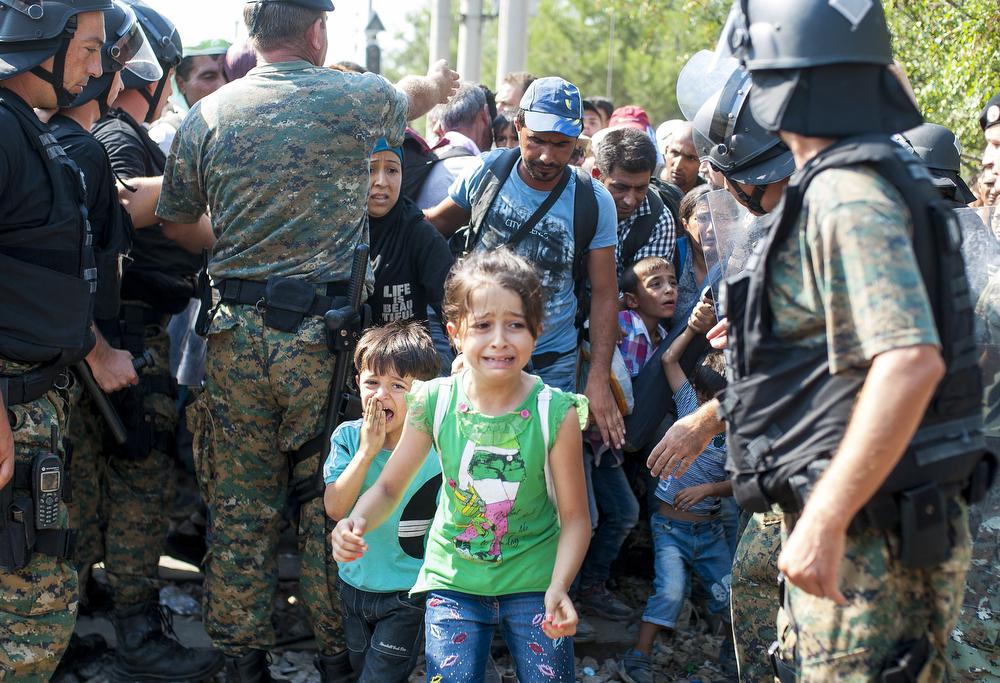It’s time for Europe to end shameful treatment of refugees with a continent-wide effort
Migrants walk past police while trying to cross the Greece-Macedonia border on Aug. 26, 2015.
LONDON — “A solemn moment of silence.” The world over, this is the traditional response when lives are cut short by tragedy.
It has also been a common response to tragedies in Europe and off its shores when thousands of refugees and migrants have been killed while making terrifying journeys in search of safety and better lives in Europe.
In the space of just a few recent days, three new tragedies added to a growing list that has brought a record number of refugees and migrants to untimely deaths this year.
Fifty-two bodies were found inside the hull of a ship about 30 nautical miles off the coast of Libya. Then, police in Austria discovered 71 corpses, including children, crammed inside a truck left abandoned at the side of the main highway between Budapest and Vienna. Police have told news media the dead were likely Syrians and apparently died by suffocation.
And, finally came news of a tragic shipwreck off the coast of Zuwara, Libya. It is feared that up to 200 may have died.
Amnesty International reported earlier that up to 4,000 refugees became trapped when Macedonia closed the border with Greece.
Paramilitary police units blocked the border crossing with razor wire and fired stun grenades at shocked families that had fled the war in Syria.
Further up the Balkans migration route in Hungary, police fired tear gas inside a crowded reception center, and Hungarian authorities were reported erecting a razor wire fence along the border with Serbia to prevent more refugees and migrants from entering.
The nature of tragedies is that they are rare and happen unexpectedly to ordinary individuals that find themselves swept up in extraordinary circumstances as they seek to flee conflict. People dying by the dozens is a tragic indictment of the failure of European leaders to provide safe ways to reach the continent.
That it is now happening with such regularity is Europe’s collective shame. European Union (EU) leaders meeting in Vienna with key EU Member States and western Balkan countries quickly gave top billing to the treatment of refugees in the region.
Amnesty International representatives recently returned from Lesvos, one of the Greek islands on the frontline of Europe’s refugee crisis. Overloaded, under-resourced authorities are failing to cope with the dramatic increase in the number of people arriving on the island — 33,000 since the beginning of August. Thousands, including many Syrian refugees, are living in squalid conditions.
These crises are symptoms of the same problem: Europe is not accepting its responsibility during an unprecedented global refugee crisis. It is failing to create safe routes for refugees.
What can be done? No more “moments of silence” — we’ve had enough of those. It is now the time for leadership, and some European leaders seem to be getting the message.
At the Vienna summit, the calls were less about Fortress Europe and keeping people out, and more about solidarity and responsibility.
Federica Mogherini, vice president of the European Commission, could not have been clearer. Europe, she said, has a “moral and legal duty” to protect asylum seekers. The right words, certainly. But they now need to be matched with action.
Recent events prove that this Europe-wide approach has never been more urgently needed. European leaders at all levels must step up and provide protection to more people, more effectively share responsibility, and show solidarity to other countries and to those most in need.
Such a response should include a significant increase in the resettlement of refugees, more humanitarian visas and more ways to reunite families. Anything less would be a moral and human rights failure of tragic proportions — something we simply cannot be silent about.
Gauri van Gulik is deputy Europe director at Amnesty International.
The story you just read is available for free because thousands of listeners and readers like you generously support our nonprofit newsroom. Every day, reporters and producers at The World are hard at work bringing you human-centered news from across the globe. But we can’t do it without you: We need your support to ensure we can continue this work for another year.
Make a gift today, and you’ll get us one step closer to our goal of raising $25,000 by June 14. We need your help now more than ever!
